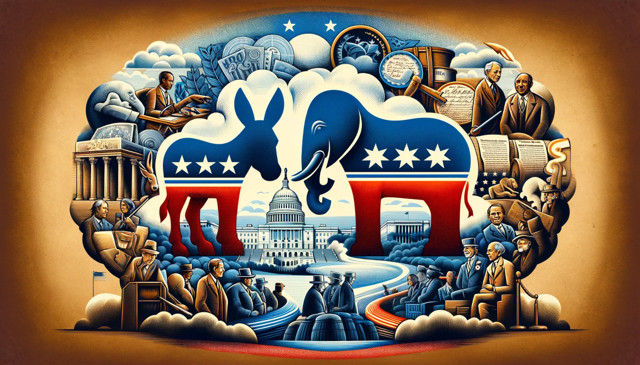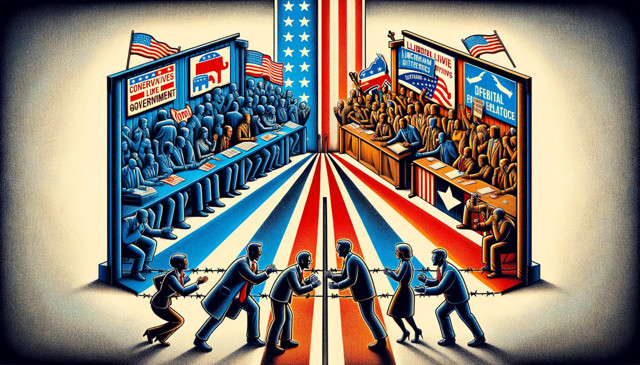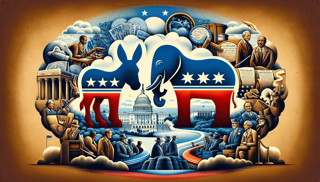December 2023
Explore the transformative journey of the United States' two major political forces. This article delves into the intricate history of the Republican and Democratic parties, tracing their roots, ideological shifts, and responses to pivotal historical events. From the Civil War's divide to the civil rights movement, and from Reagan's conservative resurgence to the contemporary battles over voting rights and political polarization, inviting readers to reflect on the future of American democracy.
Last updated 20 months ago
Will publish on 06/07/2026
Shifting Sands: The Evolving Landscape of American Politics
By Monica Granlove

The history of Republicans and Democrats in the United States is intricate, marked by ideological shifts, realignments, and adaptations to historical events. The Republican Party and the Democratic Party, the two major political entities in the U.S., have undergone multifaceted transformations over time.
The Democratic Party traces its origins to the Democratic-Republican Party established by Thomas Jefferson in the early 19th century, evolving into the modern Democratic Party in the 1820s and 1830s. During the Civil War, Democrats were divided, with some opposing secession and others supporting the Confederacy. The late 19th century witnessed a Democratic shift towards progressivism, advocating for societal and political reforms.
Amid the Great Depression, President Franklin D. Roosevelt, a Democrat, introduced the New Deal—a series of programs fostering economic recovery. Under President Lyndon B. Johnson, the Democratic Party played a pivotal role in advancing civil rights legislation in the 1960s, coinciding with a Southern shift towards the Republican Party.
Founded in 1854 by anti-slavery activists, the Republican Party emerged as a response to sectional tensions preceding the Civil War. Led by President Abraham Lincoln, Republicans championed abolition and civil rights during the Reconstruction era. In the late 19th century, Republicans were associated with industrialization and business interests, evolving to prioritize national security, law and order, and conservative social values.

A conservative resurgence in the late 20th century, epitomized by Ronald Reagan's election in 1980, emphasized limited government, free-market principles, and social conservatism. The aftermath of 9/11 brought changes under the Bush administration, sparking debates over civil liberties, surveillance, and restrictive positions on issues like LGBTQ+ and reproductive rights.
As the political landscape entered the 21st century, new challenges emerged. In recent years, Republican-led efforts to limit early voting and challenge the Voting Rights Act of 1965 have sparked controversy. Accusations of voter suppression and concerns about discriminatory practices have amplified ideological polarization.
Political polarization has intensified, with voters divided along party lines. Enthusiasm fluctuates based on the perceived effectiveness of a candidate's message and alignment with voters' values. Debates over voting rights highlight concerns about potential civil liberties infringements, particularly with stricter identification laws and gerrymandering, which both parties have employed.
Media has shaped voter attitudes and opinions, creating an environment where billions of dollars are now spent on campaigns. Is this really where Americans want money spent? For more information, read the article entitled, ‘Investing in Futures: Redirecting Campaign Billions to Education’
The late 20th century and early 21st century witnessed heightened ideological distinctions between Republicans and Democrats, with both parties adapting to changing demographics. Democrats attract urban, minority, and younger voters, while Republicans find support among rural, conservative, and older demographics. The evolving narrative of both parties reflects the dynamic and evolving nature of American politics. The debate has evolved from discussing the issues to denigrating along party lines, shifting the focus from constructive discourse to divisive rhetoric. As America continues to evolve, so too do its political parties, reflecting the ever-changing tapestry of the nation’s values and demographics.
Vote for Democracy: Power in Your Hands


